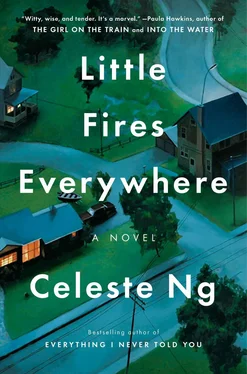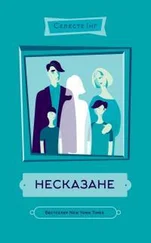“We’ll see” was all she said. Then: “And you? What are you going to be when you grow up?” In kindergarten, when the teacher had asked this question, Warren had answered with his plans for that afternoon—the afternoon being as far into the future as his five-year-old mind could imagine. Since then, “What are you going to be when you grow up” had been their way of asking about plans for the day, and even now, Mia teased him, Warren never seemed to be able to look more than a week or two ahead.
“Tommy Flaherty and I are going hunting Friday,” he said now. “Getting in one more trip before school starts.” Mia made a face. She had never approved of hunting, though everyone in their neighborhood had a deer head or two somewhere in their houses.
“I’ll call you when I get back,” she said, and kissed him on the cheek. She was struck again by how he’d grown, how he seemed leaner and stronger and more solid than she’d remembered. She wondered if there was a girl in his life. What would he look like the next time she came home, she thought—and when would that be? Summer, perhaps, unless she got a job to save up for next year. There was so much to do. Already, in the few months since she’d come to New York, her work had developed: from her time with Pauline, from studying the work of her classmates, even from the long hours she put in at her many jobs and the constant rotation of strangers she encountered there. It had become smarter and more deliberate, more technically advanced and adventurous, riskier and edgier, and everyone—including Mia herself, and Warren, waving to her through the passenger window before leaning over to crank it closed—was certain she would go far. Nothing was going to distract her from her work, she promised herself. The work was the only thing that mattered. She would not allow herself to think about anything else.
She was so focused on her work that, on the afternoon in March when the man with the briefcase began staring at her, she did not notice right away. It was midafternoon when she got on at Houston Street, heading up to her job near Columbia, and the 1 was quiet, with only a handful of passengers. Mia was thinking about her project for Pauline— Document a transformation over time —when she felt the sudden prickle on her skin that meant she was being watched. Mia was used to stares—this was New York, after all—and like all women she had learned to ignore them, as well as the catcalls that sometimes accompanied them. But this man she couldn’t quite read. He seemed respectable enough: neat striped suit, dark hair, briefcase between his feet. Wall Street, she guessed. The look in his eyes wasn’t lust, or even playfulness. It was something else—a strange mix of recognition and hunger—and it unsettled her. After three stops, when the man had not stopped staring, she bundled up her things and stepped off at Columbus Circle.
At first she thought she had lost him. The train pulled away and she settled herself onto a grimy bench to await the next one and then, as the handful of passengers cleared the station, she saw him again: briefcase in hand now, scanning the platform. Looking for her, she was sure. Before he spotted her she turned and made for the staircase at the far end of the platform and followed the tunnel, walking as briskly as she could without attracting attention, to the platform for the C. She would be late for work now, but it didn’t matter. She would get off in a stop or two and walk over to Broadway and catch the right train, once she had gotten away, even if it meant paying another fare.
When the C came, Mia stepped onto a middle car and scanned the seats. The car was half full, enough people that she could call for help if she needed, but not so full that the crowd would hide anything untoward. She settled herself into an empty seat in the center. At 72nd Street there was no sign of him. But at 81st, just as Mia rose to leave, the door at the end of the car opened and in came the man with the briefcase. He was slightly disheveled now, a few locks of his hair falling into his face, as if he had been hurrying through the cars looking for her. Her eyes met his and there was no way to pretend she hadn’t seen him. Mia’s roommate had been mugged twice walking home late at night, and her classmate Becca had told her a man had pulled her into an alley off Christopher Street by her ponytail—she’d managed to fight him off, but he had pulled out a hank of her hair. Mia had seen the bald spot. Whatever was going to happen would happen now, whether she stayed on the train or off.
She stepped off the train and he followed her, and when the doors closed they stood frozen on the platform for a moment. There was no conductor or policeman in sight, only an old lady with a walker slowly trudging toward the stairs and, at the far end of the platform, a sleeping bum in tattered sneakers. If she ran, she thought, perhaps she could make it to the stairs before he caught her.
“Wait,” the man called as the train began to pull away. “I just want to talk to you. Please.” He stopped and held up his hands. Now she could see that he was younger than she’d thought, perhaps only in his thirties, and thinner, too. His suit, she could see, was expensive, fine silver thread running through the wool, and his shoes were, too: cordovan with tassels and smooth leather soles. Not the shoes of a man who ran.
“Please,” the man went on. “I’m sorry I followed you. I’m sorry I was staring at you. You must have thought—” He shook his head. “I don’t like my wife riding the subway because I worry she’ll get followed by someone just like that.”
“What do you want?” Mia croaked. She had not realized how dry her throat was. Behind her back, she tightened her grip on her keys, points out. It doesn’t look like much, but it’ll hurt, Becca had told her.
“Let me explain,” the man said. “I’ll stand right here. I won’t come any closer. I just needed to talk to you.” He put his briefcase down at his feet, between them, and Mia relaxed an infinitesimal amount. If he tried to lunge at her now, it would trip him.
His name was Joseph Ryan—“Joey,” he’d corrected himself—and he worked, as she’d guessed, on Wall Street: he’d rattled off a string of names that she recognized as one of the big trading firms. He and his wife lived over on Riverside Drive; he was headed home now; they’d been married for nine years; they’d met as high school sweethearts; they didn’t have any children. “We can’t,” Joseph Ryan explained. “She can’t have children. And—” He stopped and looked at Mia beseechingly, ran a hand through his hair and took a deep breath, with the air of a man who knows he is about to utter something preposterous. “We’ve been looking for someone to carry a baby for us. The right person.” And then: “We would pay her. Generously.”
Mia’s head spun. She dug the points of her keys into the heel of her hand—not for protection now, but to convince her that what she was hearing was real. “You want—” she managed at last. “Why me?”
Joseph Ryan fumbled in his pocket and produced a business card, and after a brief hesitation, Mia took a single step forward and stretched her arm to take it. “Please. Will you just come and talk with us? Tomorrow? At lunch? Our treat, of course.”
Mia shook her head. “I have to work,” she said. “I can’t—”
“Dinner, then. My wife and I can explain everything to you. Look—the Four Seasons. Seven o’clock? At the very least, I promise you’ll get a good meal.” He bobbed his head like a shy schoolboy and picked up his briefcase. “If you don’t show up, I’ll understand,” he said. “I can’t imagine—having someone suggest this to you. On a subway platform.” He shook his head. “But please—just think about it. You would help us so much. You would change our lives.” And then he turned away and went up the staircase, leaving Mia standing on the platform, holding the card in her fingertips.
Читать дальше












